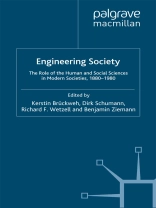Explaining crime by reference to abnormalities of the brain is just one example of how the human and social sciences have influenced the approach to social problems in Western societies since 1880. Focusing on applications such as penal policy, therapy, and marketing, this volume examines how these sciences have become embedded in society.
Spis treści
List of Illustrations List of Tables Acknowledgements Notes on Contributors Introduction. The Scientization of the Social in Comparative Perspective; B.Ziemann , R.F.Wetzell , D.Schumann & K.Brückweh Embedding the Human Sciences in Western Societies, 1880-1980. Reflections on Trends and Methods of Current Research; L.Raphael PART I: SOCIAL AND PENAL POLICY Contesting Risk. Specialist Knowledge and Workplace Accidents in Britain, Germany and Italy, 1870-1920; J.Moses Politics through the Back Door. Expert Knowledge in International Welfare Organizations; M.Lengwiler Rationalizing the Individual – Engineering Society. The Case of Sweden; T.Etzemüller The Neurosciences and Criminology: How Experts have moved into Public Policy and Debate; P.Becker PART II: DIAGNOSIS AND THERAPY The Psychological Sciences and the 'Scientization’ and 'Engineering’ of Society in Twentieth-century Britain; M.Thomson Mental Health as Civic Virtue: Psychological Definitions of Citizenship in the Netherlands, 1900-1985; H.Oosterhuis Human Sciences, Child Reform and Politics in Spain, 1890-1936; T.Kössler Narcissism: Social Critique in Me-Decade America; E.Lunbeck PART III: POLLING, MARKETING, AND ORGANIZATIONS Hearing the Masses: The Modern Science of Opinion in the United States; S.Igo Observing the Sovereign. Opinion Polls and the Restructuring of the Body Politic in West Germany, 1945-1990; A.Kruke & B.Ziemann Consumers, Markets and Research: The Role of Political Rhetoric and the Social Sciences in the Engineering of British and American Consumer Society, 1920-1960; S.Schwarzkopf Business Organizations, Foundations, and the State as Promoters of Applied Social Sciences in the United States and Switzerland, 1890-1960; E.Walter-Busch Catholic Church Reform and Organizations Research in the Netherlands and Germany, 1945-1980; B.Ziemann & C.Dols Index
O autorze
PETER BECKER Professor of History at the University of Vienna, Austria CHRIS DOLS Cultural Historian, who works and junior-researcher at the Radboud University Nijmegen, the Netherlands THOMAS ETZEMÜLLER Adjunct Professor in Modern History at the University of Oldenburg, Germany SARAH E. IGO Associate Professor of History, Political Science, and Sociology at Vanderbilt University in Nashville, Tennessee, US TILL KÖSSLER Professor for the History of Education, Childhood and Youth at the Ruhr-Universität Bochum, Germany ANJA KRUKE Head of Department of the Archiv der sozialen Demokratie at the Friedrich-Ebert-Stiftung in Bonn, Germany MARTIN LENGWILER Professor of Modern History at the University of Basel, Switzerland ELIZABETH LUNBECK Nelson Tyrone, Jr. Professor of History, and Professor of Psychiatry, at Vanderbilt University, Tennessee, US JULIA MOSES Lecturer in Modern History at the University of Sheffield, UK HARRY OOSTERHUIS Lecturer at the Faculty of Arts and Social Sciences of Maastricht University and he is affiliated with the Huizinga Research School for Cultural History, Amsterdam LUTZ RAPHAEL Professor for Contemporary History at the University of Trier, Germany STEFAN SCHWARZKOPF Associate Professor in Business History at Copenhagen Business School, Denmark MATHEW THOMSON Reader in the Department of History at the University of Warwick, UK EMIL WALTER-BUSCH Senior Lecturer Emeritus of Applied Social Research and Social Psychology at the Universities of St.Gall and Zurich, Switzerland.











